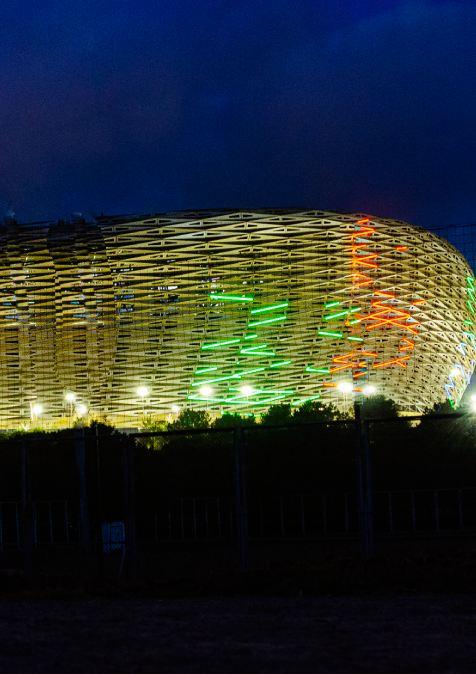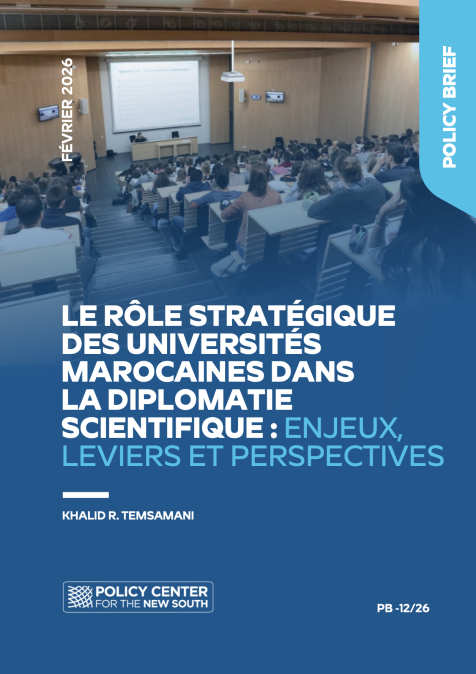In this episode, Steven Höfner explores the role of international foundations in regional governance and diplomacy. Where he emphasizes the significance of multilateral dialogue in promoting stability and cooperation, and highlights the importance of fostering transatlantic relationships to address global challenges, such as governance and security.
RELATED CONTENT
-
Aldo Liga & Sofia FormigliFebruary 27, 2026The podcast discusses the EU’s new Mediterranean Pact and how it aims to reset relations with Southern Mediterranean countries, especially the Maghreb. It highlights the main goals of the ...
-
AuthorsKhalid R. TemsamaniFebruary 26, 2026La multiplication des crises systémiques à l’échelle mondiale – qu’elles soient environnementales, sanitaires, énergétiques ou liées aux enjeux de sécurité globale – impose une évolution profonde des modes d’action diplomatique. Dans ce contexte, l’intégration structurée des connaissances scientifiques dans les relations internationales apparaît comme une condition déterminante pour la formulation de réponses collectives efficaces et légitimes. La diplomatie scientifique s’inscrit a ...
-
 AuthorsSamir BhattacharyaAbhishek KhajuriaFebruary 26, 2026Sports diplomacy can be defined as a foreign-policy approach that uses sport as a tool to advance national interests, shape international perceptions, and foster cross-border engagement. As a subset of cultural and public diplomacy, it operates where politics, identity, and popular culture intersect. In an increasingly polarised and fragmented global order, sports diplomacy has emerged as one of the ‘softest’ of soft-power instruments, able to reach audiences that traditional diplom ...
AuthorsSamir BhattacharyaAbhishek KhajuriaFebruary 26, 2026Sports diplomacy can be defined as a foreign-policy approach that uses sport as a tool to advance national interests, shape international perceptions, and foster cross-border engagement. As a subset of cultural and public diplomacy, it operates where politics, identity, and popular culture intersect. In an increasingly polarised and fragmented global order, sports diplomacy has emerged as one of the ‘softest’ of soft-power instruments, able to reach audiences that traditional diplom ... -
February 19, 2026This Africafe's episode examines Brazil-Africa relations: historical ties shaped by the slave trade and diaspora, Lula’s trade expansion, and competition with China/EU. It explores South-South diplomacy’s potential to reshape global institutions, the role of “South Atlanticism,” and fut...
-
AuthorsFebruary 17, 2026La Marche Verte fait partie de ces moments féconds qui n’ont pas cessé d’influer sur le cours des événements politiques du Maroc, par la place qu’elle a prise, dès le départ, dans la longue durée, le contexte dans lequel elle s’est déployée, la logique des interactions dans laquelle elle s’est inscrite par ses causes et ses effets, et comme une des figures éclatantes du récit national. ...
-
 AuthorsAmine GhoulidiFebruary 5, 2026This Paper was originally published on orient-online.com The Western Mediterranean’s exposure to the Sahel is usually framed in terms of security spillovers and crisis management. This paper argues that this framing misreads how Sahelian access conditions now shape Mediterranean integration. Morocco’s Atlantic Initiative is a state-led corridor strategy combining Atlantic port infrastructure, inland transit routes, and energy systems to connect landlocked Sahelian economi ...
AuthorsAmine GhoulidiFebruary 5, 2026This Paper was originally published on orient-online.com The Western Mediterranean’s exposure to the Sahel is usually framed in terms of security spillovers and crisis management. This paper argues that this framing misreads how Sahelian access conditions now shape Mediterranean integration. Morocco’s Atlantic Initiative is a state-led corridor strategy combining Atlantic port infrastructure, inland transit routes, and energy systems to connect landlocked Sahelian economi ... -
AuthorsFebruary 4, 2026This article examines the quiet but profound implications of the erosion of U.S.-led hegemony for small and vulnerable states of the New South. While the post-1945 international order was never egalitarian, it offered predictability: power was organized through law, and sovereignty for weaker states rested less on justice than on procedural stability. Davos 2026 marked a turning point in the public acknowledgment of that system’s unraveling. Statements by leading Western figures rev ...
-
Helmut Sorge & Maria Fernanda BozmoskiJanuary 28, 2026This podcast examines the evolving U.S.–Latin America relationship amid shifting geopolitical dynamics and growing multipolarity. It highlights the region’s rising strategic importance al ...
-
Massimo Khairallah & Alae JellalJanuary 21, 2026This episode of the special series of the Atlantic Dialogues podcast examines the rising role of MENA middle powers as diplomatic brokers amid shifting alliances and declining security gu ...
-
January 21, 2026The Policy Center for the New South hosted a seminar on January 16, 2026, titled “Crisis or Opportunity? Multilateralism in a Polycentric World.”The discussion addressed the growing strain on global cooperation amid overlapping financial, climate, security, and technological shocks, occ...






